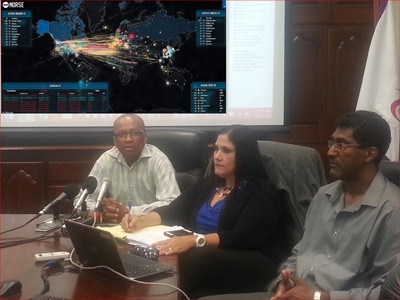![]() BTL customers are having a very frustrating week due to browsing issues stemming from an attack on the company’s internet system.
BTL customers are having a very frustrating week due to browsing issues stemming from an attack on the company’s internet system.
BTL’s digital subscriber line (DSL) customers have been frustrated by slow internet speed for a while now. On June 23, BTL announced that DSL customers in Belize City and San Pedro were experiencing slow internet service. The company believed that it was caused by a prolonged internal power outage which occurred on June 22. On June 24, the company realized that the interruption in DSL service was not related to the power outage and informed customers that they were investigating the root cause of the interruption. On June 25, the company announced that the issue had been resolved. They were wrong. The root cause at that point had not even been identified as yet. Shortly after it was announced that the issue had been resolved, internet speed slowed to a snail’s pace. On June 26 after the company experienced another internal power outage, it informed DSL customers that the service interruption being experienced is as a result of ‘external attacks’. As BTL technicians started to put steps in place to upgrade the network and improve the security settings, the attacks were ramped up. On Monday, June 30, internet service was off more than it was on. On Tuesday, July 1, the attacks peaked and DSL internet was completely shut down most of the day. This caused Dionne Miranda, General Manager of Customer Services, to call a press conference in order to provide an update for customers. Miranda and Kevin Hope, Chief Technology Officer, shed some light on the nature of the external attacks.
According to Miranda, there are millions of cyber attacks taking place every second around the world. The greatest number of attacks take place between the United States and China as the two countries are engaged deeply in a cyber war. Last year the National Nuclear Security Administration, which is responsible for the stockpile of the United States’ nuclear weapons, reportedly experienced over 10 million cyber attacks per day. Therefore, cyber attacks are nothing new. Not even to Belize. Many Belizeans have experienced cyber attacks. The most common type of attacks experienced in Belize has been the hijacking of servers to be used as ‘zombie’ computers. BTL’s security software is equipped to protect against such type of attacks and most others. However, the company was not shielded from a DDoS attack.
A Distributed Denial of Service (DDoS) attack in simple terms is an attempt to overload a web site or server causing it to go extremely slow or completely crash. This is done by using a network of zombie computers and directing significant traffic to the site or server. The hacker programs all the zombie computers to repeatedly contact the targeted site or server. Many times these computers contact the sites or servers with masked request (request that they may recognize but cannot process). This overload of traffic causes service to be extremely slow for legitimate users and could result in an eventual crash. A St. Louis based security company, Norse, has an interactive cyber threat map that shows attacks that are taking place in real time. At around 10:30 a.m. on Tuesday, July 1, BTL was on the top ten cyber attack list. Hope says they are not able to tell who exactly is responsible for the attacks at this time but they can say that it is from the China area.
Dionne Miranda says this experience has shown that internet is now an essential service as many business operations had to be haulted due to the interuption in service. Some offices used the Edge mobile network to continue operations and when that was faulty they use the Google public server. Those who were not aware of those options called it a day. Therefore, the internet interuption combined with the lure of the World Cup made this week one of the least productive in recent history.
Hope says he expects the system to be back to normal before Friday. Miranda says, “These cyber attacks are happening around the world in real time and we are just now one of the victims, but we are going to emerge as the victor very soon because we are finding a solution to that.” Internet attacks have an estimated cost of US$400 billion a year.




